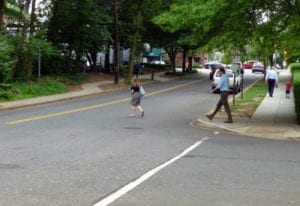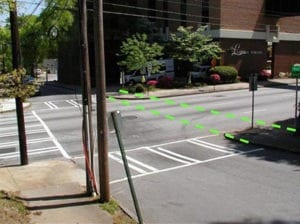In a recent year, the National Highway Traffic Safety Administration recorded 3,142 distracted driving-related fatalities in the United States. These incidents are tragically common, and what's more, a distracted driving-related death can occur […]
The concept of an unmarked crosswalk is often misunderstood. Unfortunately, this lack of familiarity and understanding can lead to serious car accidents involving pedestrians. Texas has specific laws that define the responsibilities of both drivers and pedestrians with regard to unmarked crosswalks, and we're happy to elaborate on the subject.
While most everyone knows that vehicles must stop for pedestrians using a marked crosswalk, many drivers don't realize that they're also required by law to yield the right-of-way to pedestrians crossing at "unmarked" crosswalks.

Essentially, almost every intersection is also considered to represent a crosswalk (even when there are no indicators or painted crosswalk lines). Think of an unmarked crosswalk as an extension of a sidewalk that extends across intersecting roads. Every corner is a crosswalk whether it is painted or not.
Under Texas law, vehicles are required to yield the right-of-way to pedestrians in a crosswalk, marked OR unmarked, when in the same half of the roadway as the pedestrian (or if a pedestrian is approaching your half of the roadway from the opposite side of the road).
If a pedestrian is approaching traffic from a sidewalk that crosses an alley, private road, driveway, or building, approaching vehicles must yield the right of way.
If a crosswalk is equipped with traffic lights, pedestrians must only cross when they are facing a green light (unless that signal is a sole green arrow). If the intersection is equipped with pedestrian control signals, the pedestrian may only cross when facing a "Walk" signal.

Pedestrians must yield the right of way to vehicles any time they are attempting to cross anywhere other than a marked crosswalk or unmarked crosswalk located at an intersection.
§ 552.005 (b) of the Texas Transportation Code states that "Between adjacent intersections at which traffic control signals are in operation, a pedestrian may cross only in a marked crosswalk." This means that pedestrians are still free to cross the street (when safe) at any point between intersections if at least one of the two adjacent intersections is not controlled by a signal. If both adjacent intersections are equipped with traffic lights, the pedestrian must only cross at the intersection.
While some drivers may consider crossing between intersections as jaywalking, Texas law clearly states otherwise. At the same time, some cities and municipalities may have enacted local ordinances which place additional rules on pedestrian crossings, so it is best to check with your local police department or city hall for any related ordinances.
The following sections from the Texas Transportation Code provide some additional clarification regarding the obligation of both pedestrians and drivers:
If you've been injured while crossing a roadway and are unsure of how the law applies in your situation, give us a call at (214) 651-6100. We're happy to provide a free consultation over the phone (or email), and can let you know exactly what your options are moving forward.
Note: The information that was utilized in this post was gathered from the use of secondary sources. This information used has not been confirmed or independently verified. If you locate any information that is not correct, please contact our firm as soon as possible so that we can make the appropriate corrections. If you find any information that is false, we will remove or correct the post immediately after it is brought to our attention.
Disclaimer: As a valued member of the Dallas community, Rasansky Law Firm’s goal is to improve the safety of all residents in the great state of Texas. These posts should not be viewed as a solicitation for business and the information included herein should not be taken as medical or legal advice. The photos used in this post are not representative of the actual crash scene.
Over 30+ Years Of Personal Injury Experience
Top-Rated and Award-Winning Personal Injury Lawyers
Attorneys Available to Discuss Your Case Now
No Fee Unless You Win
Free Confidential Consultation.
Fill out the form below to receive a free and confidential initial consultation with an experienced personal injury lawyer.